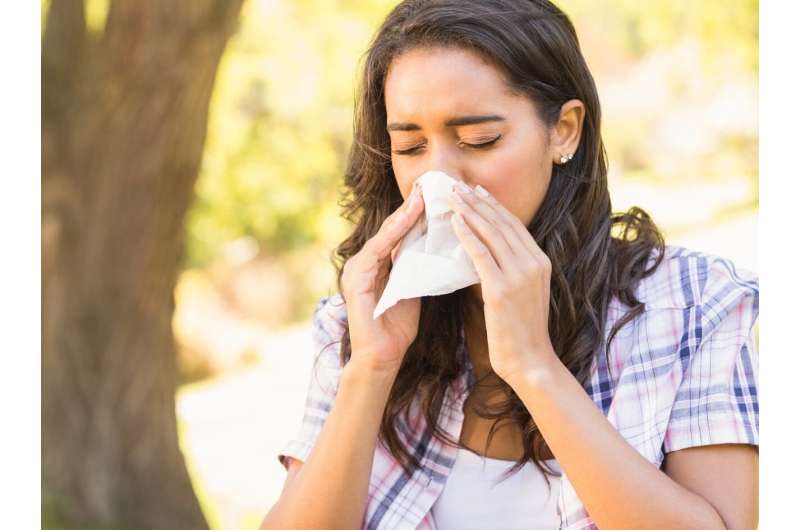This article has been reviewed according to Science X's editorial process and policies. Editors have highlighted the following attributes while ensuring the content's credibility:
fact-checked
reputable news agency
proofread
Spring allergies have wide-ranging effects, say experts

Spring allergies bring to mind thoughts of stuffy noses and watery eyes. But allergies actually affect many different and interconnected systems within a person's body, according to the American College of Allergy, Asthma and Immunology (ACAAI).
"Spring allergens such as pollen, mold spores and other airborne particles not only trigger nasal allergies, but also can have a profound effect on a variety of allergic conditions including asthma and eczema," said ACAAI President Dr. Gailen Marshall.
"Understanding how all the allergic responses are interconnected is crucial for effectively managing and improving the overall quality of life for people who are affected," Marshall added in an ACAAI news release.
Nasal allergies. Inhaled pollen triggers an allergic reaction in people with allergies, prompting symptoms like sneezing, itching and nasal congestion.
Asthma flares. That same pollen and other airborne allergens also can trigger a full-fledged asthma attack, producing wheezing, coughing and difficulty breathing as airways tighten.
Eczema. Spring allergens can combine with warmer temperatures to affect the skin. Pollen and other environmental allergens can trigger flare-ups of eczema, a chronic inflammatory skin condition.
Eye allergies. Red, swollen eyes—a result of seasonal allergic conjunctivitis—occurs thanks to plant pollens in the air. Typical symptoms include itching, redness, burning, watery eyes, dark circles under the eyes and puffy eyelids.
Experts noted that these different allergic conditions often go hand-in-hand.
For example, nasal allergies often lead to asthma, a progression called the "allergic march," the ACAAI says.
Likewise, eye allergies often accompany the runny nose, sneezing and nasal congestion associated with nasal allergies.
So how can a person fight these annual allergic plagues?
- Get the right symptom relievers. Antihistamines, nasal corticosteroids and bronchodilators all play a crucial role in easing the symptoms of spring allergies. Moisturizers can help eczema, and artificial tears can wash away eye allergens. Take note of your annual symptoms and buy the right remedies to target those symptoms
- Avoid allergens. Figuring out your allergens will help you avoid them. Keep windows shut to keep out pollen, take a shower at night and wash your clothes after being outside.
- See an allergist. A board-certified allergist can detect your specific allergens and help you develop a plan to get your symptoms under control. They might even suggest allergen immunotherapy, which can provide long-term relief by modifying your immune system's response to specific allergens.
More information: Yale School of Medicine has more about seasonal allergies.
Copyright © 2024 HealthDay. All rights reserved.


















